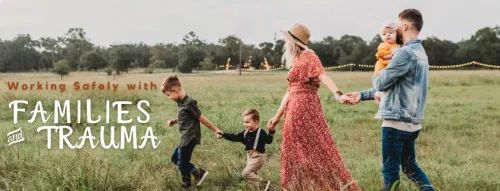WORKING SAFELY with FAMILIES & TRAUMA | In-house Training
- Friday 1 January 2027
- 1:00 am - 1:00 am
- Your location
| Customer Rating | 4.84 out of 5 ⭐ |
|---|---|
| CPD Hrs | 15 |
| Includes | Handbook and certificate |
In-house training: If you have a group of staff we can arrange training at your workplace. Email us.
A Neurobiological Approach to Trauma Stabilisation and Family Therapy
Families affected by traumatic events can often break down as each family member struggles in their own way to come to terms with what has happened. Understanding distress reactions and their effect on family dynamics can help the family to cope better. If family members don’t understand each other’s experience, then misunderstandings, communication breakdowns and other problems can result. This is often because unresolved traumatic symptoms fuel behavioural and emotional problems and family conflict, and/ or the family interactions can maintain or exacerbate the pain of traumatic memories.
Most practitioners have by now heard the message that trauma treatment must begin with an emphasis on safety and stabilisation, otherwise "working through" will be re-traumatising. Yet it is often very difficult to know exactly how to begin to help the trauma client stabilise. As practitioners, we can easily get so caught up in the roller coaster ride of crises, suicide attempts, hospitalisations, addiction relapses, and self-destructive acting-out that we ourselves start to feel out of control! This workshop integrates a neurobiologically informed understanding of trauma, dissociation, and attachment within framework of family therapy. As with any teaching paradigm, the practitioner needs educational models and tools. For trauma stabilisation work, the most important tools are: psychoeducation, therapist modeling of attention to safety, skill-building, and empowering the client by teaching them how to take charge of the therapeutic process. The workshop will demonstrate how to:
- teach clients about trauma symptoms: how to recognise them, how to anticipate them, what they mean, how to manage them
- decrease the client's shame, confusion, and sense of being overwhelmed
- mobilise the strengths of families to amplify healing and change
Additionally, the practitioner also performs an important modeling function, ideally this beginning at the very first contact with clients. Practitioners need to model their constant concern and interest in the client's safety and self-care. As it indirectly teaches the client new skills and it directly offers the client an experience of safety. This workshop will demonstrate the skills needed by trauma clients in order to stay stable include the following:
- understanding that many of their trauma symptoms are memory equivalents
- grounding and centering techniques
- coping strategies for dealing with individual and interpersonal distress
- contracting for safety with themselves and others
- how to anticipate stressful or triggering events
- learning how to calm the body and mind
- distinguishing past and present reality and how to stay "in the present" along with recognising and making better use of dissociative abilities
- working with the impact of trauma on identity, and redefining the client's role from that of victim to that of survivor
Weaving a range of unique interventions adapted from a number of cutting-edge therapeutic approaches, including sensorimotor psychotherapy, family systems, mindfulness-based therapies, and EFT. This workshop provides a practical approach to trauma treatment in family systems, communicated in straightforward language accessible to both clients and practitioners. Participants will leave with a solid grasp of therapeutic approaches to trauma stabilisation, working with dissociative symptoms, integrating brain-based treatment methods, and much more. Most of all, they will come away with tools for helping clients create an internal sense of safety and compassion.
Audience: for mental health, education and other professional that applies behavioural/developmental/neuro-science and systemic thinking to their practice.
Mental Health Professionals: All mental health professionals including, but not limited to Clinical Counsellors, Psychologists, Psychotherapists, Psychiatrists, Social Workers, Nurses, Occupational Therapists, Hospice and Palliative Care Workers, Youth Workers, Mental Health Workers, Addiction Specialists, Marital & Family Therapists, Child Protection and Disability Workers, Guidance Officers, Speech and Language Therapists, Residential Care Workers and Foster Support Workers, Vocational Rehabilitation Consultants, General Practitioners, and all other mental health professionals looking to enhance their therapeutic skills.
Education Professionals: Professionals who work with children or youth including, but not limited to K–12 School Counsellors, School Paraprofessionals and all other professionals who support behavioural challenges and complex learning needs.
Credit for Recognised Prior Learning: Interested in working towards becoming a family therapist? Working Safely with Families and Trauma is a credited workshop of Recognised Prior Learning with the Family Systems Institute as part of its training programs in family therapy. For more information go to www.thefsi.com.au












